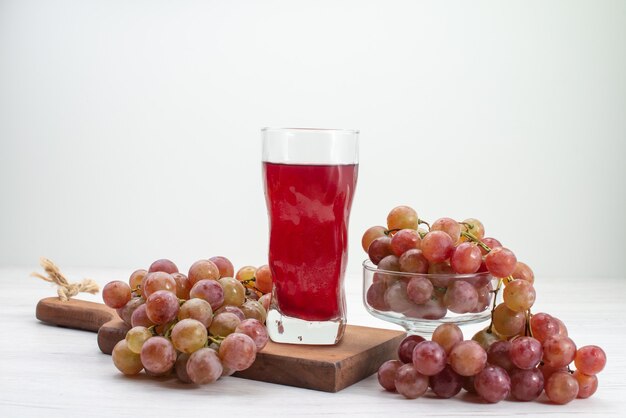Grape juice is a popular beverage praised for its potential health benefits. Packed with a rich blend of vitamins, minerals, and antioxidants, it’s often marketed as a healthy choice for people of all ages. Many individuals turn to this juice as a convenient way to include fruit in their diet. But how healthy is grape juice, really? Does it live up to the hype?
In this article, we’ll explore the nutritional profile, health benefits, and considerations to help answer the question: Is grape juice good for you? Let’s dive in and uncover the science behind this popular drink.
Nutritional Profile
Let’s breakdown the nutritional profile of grape juice.
Calories
A standard 8-ounce glass of it contains about 150-160 calories. This can vary slightly depending on the brand and whether it’s made from Concord or white grapes. These calories primarily come from natural sugars in the juice, which give it its sweet flavor.
Sugar Content
This juice is naturally high in sugar. One glass may contain 36-38 grams of sugar, similar to a serving of soda. While these sugars are natural, excessive consumption can contribute to weight gain and other health issues if not balanced with physical activity and a healthy diet.
Vitamins and Minerals
Grape juice is a good source of essential vitamins and minerals. It contains:
- Vitamin C: Boosts immunity and skin health.
- Vitamin K: Supports blood clotting and bone health.
- Potassium: Regulates blood pressure and muscle function.
Additionally, this juice contains small amounts of iron, magnesium, and calcium, contributing to its overall nutritional value.
Is 100% Grape Juice Healthy?
100% pure juice is healthier than processed juices with added sugars and artificial ingredients. However, even 100% juice should be consumed in moderation due to its high natural sugar content. Opt for unsweetened varieties to maximize benefits.
Health Benefits

The health benefits of grapes are mentioned in detail here.
Is It Good for Your Heart?
Yes, it is often considered heart-healthy. It contains powerful antioxidants that can support cardiovascular health.
How Antioxidants Support Cardiovascular Health?
Grape juice is rich in polyphenols, compounds that improve blood flow and reduce the risk of blood clots. These antioxidants protect the heart by reducing oxidative stress and inflammation in blood vessels.
Role of Resveratrol in Improving Heart Health
Resveratrol, found in grape skins, is a key antioxidant. It helps lower bad cholesterol (LDL), increase good cholesterol (HDL), and reduce the risk of heart disease.
Is It Good for Weight Loss?
This juice can fit into a weight-loss plan when consumed in moderation. Its natural sugars provide quick energy, but its calorie content can add up if overconsumed.
Calories vs. Benefits: Is It Worth It?
For those managing weight, the key is balance. A small serving can provide antioxidants and nutrients without overloading on calories. Pair grape juice with fiber-rich foods for better satiety.
Does It Have Antioxidants?
Yes, it is packed with antioxidants like flavonoids and resveratrol. These compounds protect the body from free radicals that can damage cells.
How Antioxidants Help with Inflammation and Immunity?
Antioxidants in grape juice reduce inflammation, boost immunity, and support overall health. They may also lower the risk of chronic diseases such as arthritis and certain cancers.
Is It Good for Your Skin?
Yes, it can promote healthier, glowing skin. Its high antioxidant content combats free radicals that lead to skin damage.
How Antioxidants Fight Signs of Aging?
The antioxidants in grape juice, such as resveratrol and vitamin C, help reduce wrinkles, improve skin elasticity, and protect against UV damage.
Is It Good for Diabetics?
It can be tricky for diabetics. Its high sugar content may cause blood sugar spikes if not consumed carefully.
Can Sugar Content Impact Blood Sugar Levels?
Yes, the natural sugars in it can raise blood sugar levels. Diabetics should consult a healthcare provider before including grape juice in their diet and opt for small servings if allowed.
Is It Safe During Pregnancy?
It is generally safe during pregnancy when consumed in moderation. Its vitamins and antioxidants can benefit both the mother and baby.
Nutritional Benefits for Expecting Mothers
The vitamin C in grape juice supports immune health, while potassium helps manage blood pressure. However, pregnant women should monitor sugar intake and choose 100% juice options without additives.
Potential Side Effects

While grape juice is celebrated for its health benefits, it’s not without drawbacks. Its high antioxidant content supports heart health, skin rejuvenation, and immune function. However, excessive consumption can lead to potential health concerns, such as weight gain or increased blood sugar levels. Striking the right balance is key to enjoying its benefits without the risks.
Sugar Overload: Concerns for Diabetics and Weight Watchers
Grape juice is naturally high in sugars. A single 8-ounce glass can contain up to 38 grams of sugar. For diabetics, this can cause blood sugar spikes, increasing the risk of complications. For those watching their weight, the calorie-dense nature of this juice may lead to unwanted pounds if not consumed moderately.
Allergies and Intolerances
Some individuals may experience allergic reactions to grape juice. Symptoms like itching, swelling, or stomach discomfort could indicate an intolerance to components in the juice. If these occur, it’s best to stop consumption and consult a healthcare provider.
Comparing Grape Juice Brands
Is Welch’s Grape Juice Good for You?
Welch is a widely recognized brand. It’s made from Concord grapes, known for their high antioxidant content, including resveratrol. While it is a good option for a nutrient-rich drink, it’s still high in natural sugars. Choosing Welch’s 100% grape juice over their juice cocktails or blends ensures you avoid added sugars.
Differences Between 100% Juice and Juice Drinks
100% grape juice contains only the juice of grapes with no added sugars or artificial ingredients. Juice drinks or cocktails, on the other hand, often contain added sugars, preservatives, and flavorings. These can dilute the health benefits of the beverage.
How to Choose the Healthiest Grape Juice
Look for products labeled “100% purity” and check the ingredient list. Avoid juices with added sugars or artificial flavors. Organic options may also be a healthier choice as they are free from pesticides.
Related to Read: Are Grapes Acidic? Should You Avoid Grapes With Acid Reflux?
Tips for Incorporating It into Your Diet
How Much Grape Juice Should You Drink Daily?
A safe serving size is around 4 to 8 ounces per day. This amount provides antioxidants and nutrients without excessive sugar or calories. Moderation is key to avoiding potential side effects like weight gain or blood sugar spikes.
Healthy Ways to Enjoy It
- Dilute with Water: Mixing grape juice with water reduces sugar intake while keeping the flavor.
- Add to Smoothies: Combine with yogurt, spinach, and berries for a nutrient-packed drink.
- Freeze as Popsicles: Make refreshing and healthy treats by freezing diluted grape juice.
Alternatives: Fresh Grapes vs. Grape Juice
Fresh grapes are a healthier choice compared to their juice. They contain fiber, which aids in digestion and slows sugar absorption. Opt for whole grapes when possible, but this juice can be a convenient alternative for quick nutrition.
FAQs
Does Grape Juice Have Antioxidants?
Yes, this juice is rich in antioxidants such as flavonoids, resveratrol, and vitamin C. These compounds fight free radicals, reducing oxidative stress and supporting heart, skin, and immune health.
Is Welch’s Grape Juice Good for You?
It is a good option for its high antioxidant content and natural ingredients, especially if you choose its 100% juice. However, like all grape juice, it’s high in natural sugars, so moderation is key.
How Much Sugar Is in Grape Juice?
A standard 8-ounce serving of this juice contains 36-38 grams of sugar. This sugar is natural, but the amount is similar to soda. Diluting grape juice or consuming smaller servings can help reduce sugar intake.
Can Grape Juice Help with Weight Loss?
This juice may indirectly support weight loss due to its antioxidant properties. However, its high calorie and sugar content can hinder weight loss if consumed in large amounts. Pair it with a balanced diet and regular exercise for the best results.
Is 100% Grape Juice Healthy?
Yes, it is a healthier choice compared to sugary drinks or cocktails. It’s free from added sugars and preservatives, offering a concentrated source of vitamins, minerals, and antioxidants. However, its natural sugar content means it’s best enjoyed in moderation.
Conclusion
Grape juice offers a wide range of health benefits, from supporting heart health to enhancing skin and immune function. However, its high sugar content means it should be consumed in moderation. For the best results, opt for 100% pure juice without added sugars. Whether you’re seeking antioxidants, heart support, or a quick vitamin boost, this juice can be a tasty and nutritious addition to your diet.

